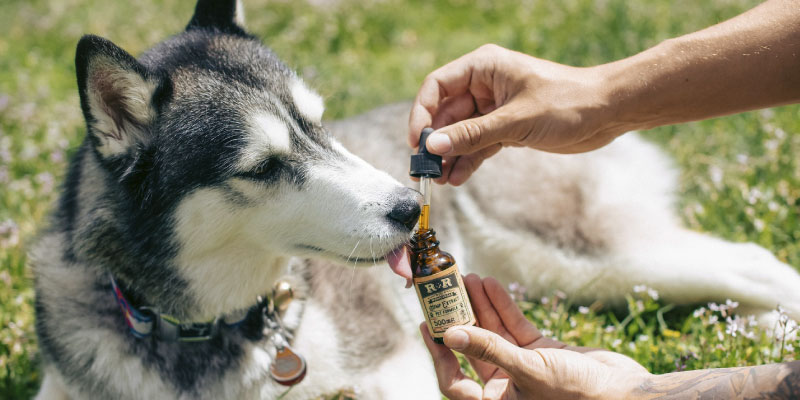If you are considering getting CBD oil for your dog, it’s time to read up and demystify this treatment as we look at the good, the bad, and the ugly side of pooch friendly CBD oil.
When it comes to dog ownership, we all want our pups to live as comfortable a life as possible. As our dogs get older, however, they become more susceptible to pain. It could simply be accidents caused by reduced co-ordination, chronic conditions such as arthritis, or joint pain caused by being overweight.

If you’re worried about giving your dog prescribed drugs, or want a cost-effective alternative, CBD oil could just be the answer.
It’s the subject of much contention for both human and animal use, but some scientists believe it has healing properties thanks to its all-natural formula. We take a look at both the pros and cons so you can make an informed decision.
What is CBD?
CBD, an abbreviation for cannabidiol, is a derivative of hemp or cannabis. While hemp is what we see in rope or fabric, cannabis is generally used as a recreational drug.
The latter may cause alarm to some dog owners, but read on. What gives traditional cannabis (the one that is smoked) its ‘high’ feeling is a chemical called THC, or tetrahydrocannabinol.
CBD is one of over 80 different chemical compounds of this plant and (more importantly) CBD has no mind-altering effects. In fact it shares many important metabolic pathways with non-steroid anti-inflammatory drugs such as ibuprofen.
How can I give CBD to my dog?
The most common ways to administer CBD for dogs are to give them pills, oils, chews or treats.
Caution should be taken here – they must say that they are for dogs on the label. While humans also take CBD in a number of forms, there may be additional ingredients that are not suitable for canine species.
For example, human-based products may contain artificial sweeteners, which are lethal for dogs.
How can I use CBD to treat my dog?
There have been many studies on CBD for dogs and its effectiveness with various ailments.
For example, scientists have studied its effects on dogs with arthritis, epilepsy, and generally jumpy dogs who may become paranoid in their old age.
In addition, CBD has been linked to treatment of general anxiety and phobias, as well as nausea, loss of appetite and inflammation. Some studies even claim CBD can be used to treat canine autoimmune diseases.
So, what were the results of these studies?
CBD for canine osteoarthritis and joint pain
In 2018, Dr Joe Wakshlag of Cornell University College of Veterinary Medicine conducted an experiment. He wanted to see if CBD oil, in this case, derived from hemp, could reduce the painful effects of canine osteoarthritis.
The test was a ‘blind’ test, so owners did not know which dogs had been given the treatment, and which had not. 16 dogs received CBD oil every 12 hours for four weeks. Owners were asked to fill out questionnaires reporting on their dogs’ perceived levels of pain. They were asked to note down any changes in mobility and activity, while the dogs also had blood tests.
More than 80 per cent of the dogs taking CBD were noted to have shown “significant levels of improvement” and a better quality of life. There were no noticeable side effects.
CBD for epilepsy in dogs
In a 2018 study at Colorado State University, Dr Stephanie McGrath tested 16 dogs to measure the effectiveness of CBD to control seizures.
Again, 16 dogs were used, and nine were trialled with CBD. She reported that a staggering 89 per cent of dogs who received the CBD had a noticeable decrease in the number of seizures.
What are the dangers of giving CBD to dogs?
The scientific data we have at present is very limited – testing very small sample sizes on just two of many conditions. Additionally, one of the biggest concerns around dogs are just how CBD is affecting them.
The question is: are they genuinely experiencing less pain, or do they no longer care?
This is particularly pertinent when we consider CBD oil and anxiety. Mark Verdino, senior vice president and chief of veterinary staff at North Shore Animal League America, said: “Dogs seem to be less reactive to low level stimuli and certain anxieties.”
As such, our limited knowledge could be a problem – it could simply be that CBD oil makes dogs drowsy, rather than help with anxiety (though notably, not ‘high’, like THC).
Other potential side effects
While it may not be a major concern to see your dog a little drowsy, other studies have noted some unsavoury side effects of CBD oil in dogs. One such effect is dry mouth, which you may notice if your dog suddenly starts drinking a lot of water.
Another is low blood pressure. In addition to drowsiness, your dog may temporarily feel light-headed, so it’s best to keep an eye on your dog and always monitor the dosage.
Accessing CBD
Beyond the potential side effects, there are also legal implications with medicinal cannabis-derived products.
In the UK, the Veterinary Medicines Directorate advises that CBD products should not be sold as food supplements for animals. As such, veterinarians are not allowed to prescribe or promote them.
For humans, the law is that CBD oil products must have less than 0.2 per cent THC to be used for medical reasons.
However, the law is changing: in 2018, the Veterinary Medicines Directorate made a statement concerning the physiological effects of CBD. As a result, products for animals will need marketing authorisation, which may mean it’s harder to come across these products.
Where can I get CBD for my dog?
The Veterinary Medicines Doctorate is now working with manufacturers to ensure they satisfy requirements to protect the health and safety of dogs.
The most common form of CBD for dogs is CBD oil, which can be purchased online from trusted suppliers.
Strictly speaking, it is illegal for pet owners to administer medicine that has not been prescribed by a vet. According to the VMD, medicine has to be “medicinal by presentation” or “medicinal by function”, so if your chosen product is making these claims, then there could be legal issues. Always talk to your vet first if you are considering trialling CBD on your dog.
Never buy a product that is designed for humans, as its ingredients could be toxic to dogs.
A good product will come at a price – it needs to be of the highest purity so as not to harm your dog. It should also give clear instructions as to the dosage and any side effects.
Will CBD oil work for my dog?
At this stage, it is too early to tell how effective CBD oil is for all dogs. There are a large number of variables to consider, including age, ailments and breed. If you are concerned, talk to your veterinarian about products you have researched.
Remember that THC is toxic for dogs, and also could be illegal in the wrong doses, so never buy a product that contains this chemical. Above all, consider that it could simply be a case of trial and error. While oil may work for some dogs, treats may work better for others.
CBD oil can help with chronic pain in your dog and keep your dog more comfortable in it’s older years, but if you are thinking of buying it to treat your dogs anxiety or hurting limbs from over weight, maybe consider alternatives or lower doses of CBD whilst you fix the underlining problem.
Whether that means encouraging a healthy lifestyle will also help to improve your dog’s long-term health, or get a dog trainer to help with specific anxieties. CBD is not a fix all, but can help whilst you find a long term solution.
Above all, if you are going to trial CBD, remember it is for medicinal purposes. It’s not catnip, so don’t treat it like a treat!




